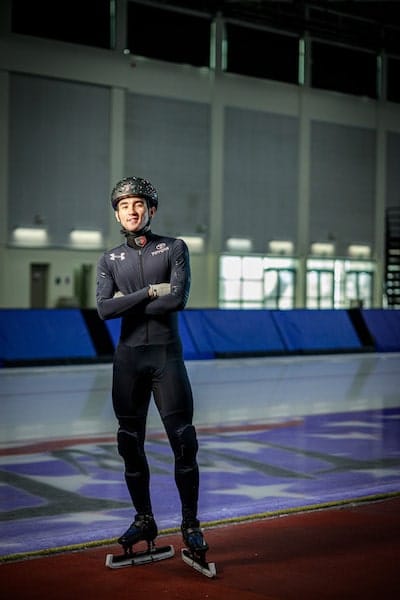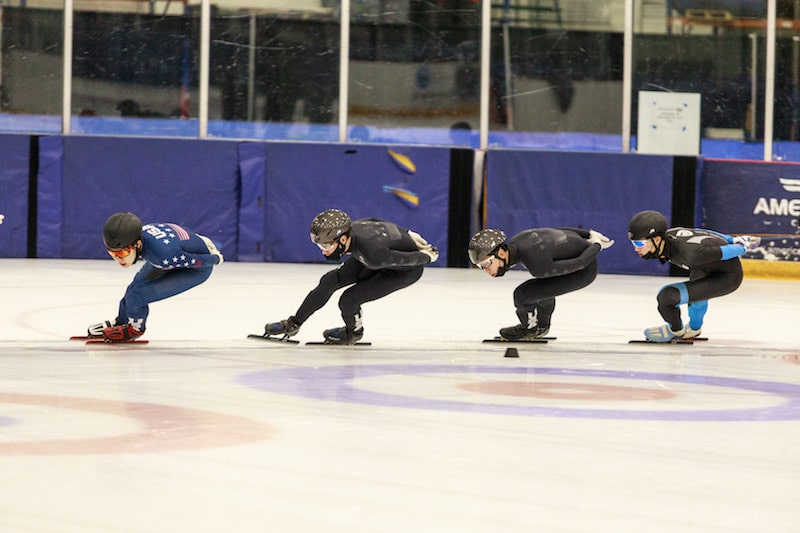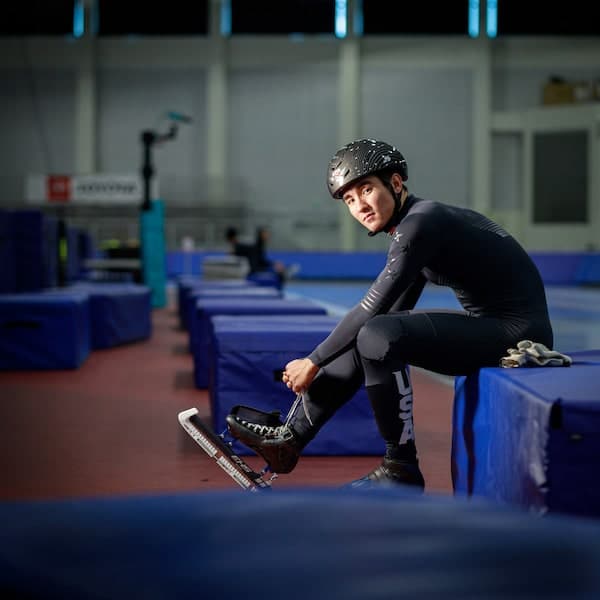
Persistent. Positive. Passionate.
These are the words that describe Ben Thornock, a Utah-based speedskater. He’s one of 11 skaters on the USA short track team headed to the 2022 Winter Olympics in Beijing.
Short-track racing was first added to the Olympics in 1992. Skaters explode from the starting line and reach speeds up to 35 mph as they muscle down an oval track that is 111.1 meters in length. “You have to put in work every single day and you have to be committed. You also have to enjoy what you do because if you don’t, you won’t be able to go in every day and give your best.”
For Thornock, giving his best consists of waking up at 8 a.m. and heading over to the Olympic Oval in Kearns. After a 30-45 minute warm-up session, he and his teammates get on the ice for an hour or two. Then after lunch there is another workout on the ice followed by dryland or weights workout

Thornock started skating near his home at age 11. “When I started skating my love for the sport was very different from what it is now.There are a lot of different variables in short track, so it was a good challenge for me and kept me interested for all these years.”
He says now he has a “love-hate” relationship with the sport. The ‘hate’ part perhaps stems from his always seeking to achieve his own goals, and the sports inherent unpredictability.
“I think it’s really like NASCAR on ice, anything can happen at any moment.”
The “love” part comes from a deep appreciation for the craft of short track racing. “It’s so special, what you have to do. The amount of lean you have to get on your edges, on your skates, on your blades .For all of that to come together and to make something beautiful is amazing.”

His favorite skating memory is winning a bronze medal in a relay during the 2017 Junior Worlds Championship in Austria.“We had great teamwork and [during the] semi-final, it was coming down to the last few laps and I had pushed Thomas [Hong] to finish out the laps and he was gonna qualify into second but unfortunately was passed and I thought we were done.”
Another team was ultimately disqualified and the Americans were able to move on to the final. “We went out there and did our best and we did set an American Junior record,” Thornock reflected.
Training for this Olympics has been challenging due to Covid. “It was really tough for a lot of us who weren’t able to train together but we did Zoom training.It’s really hard to be motivated to train on your own when we’ve trained with teammates most of our careers.”
Thornock is proud to represent Utah. His life is unique because of his ties to both this state and Japan. Thornock is half-Japanese. He’s hitting the ice after a two-year hiatus, when he served a mission in Japan for The Church of Jesus Christ of Latter-Day Saints. For most athletes, a break this long would have led to early retirement. But Thornock says his mission helped prepare him for the next phase of his career as an athlete.
“If I didn’t go on my mission, I think that would’ve been more of an identity crisis for me. It was something that I don’t regret at all.”

Thornock says his mission helped connect him to his Japanese roots in a way he’s never before experienced. For him, being an athlete and being a missionary are not so different. He says goal setting was a big part of being a missionary and that transfers over to being an athlete. “I’ve just tried to apply all these things to my skating and I think it’s not only made me a better athlete, but it’s made me a more successful person as well.”
When it comes to advice for other aspiring local athletes, Thornock has a simple but sage message: Just to have fun. “That’s first and foremost. If you’re not having fun, you won’t want to do it, right? So find things that make it fun whether that’s concentrating on getting better or helping your teammates out.”
RELATED CONTENT
How to Train to Become An Olympic Gold Medalist
An Unforgiving Sport: Olympic Speed Skating Hopefuls Train at Kearns Ice Oval
Training Athletes For Life— Athletic Republic





